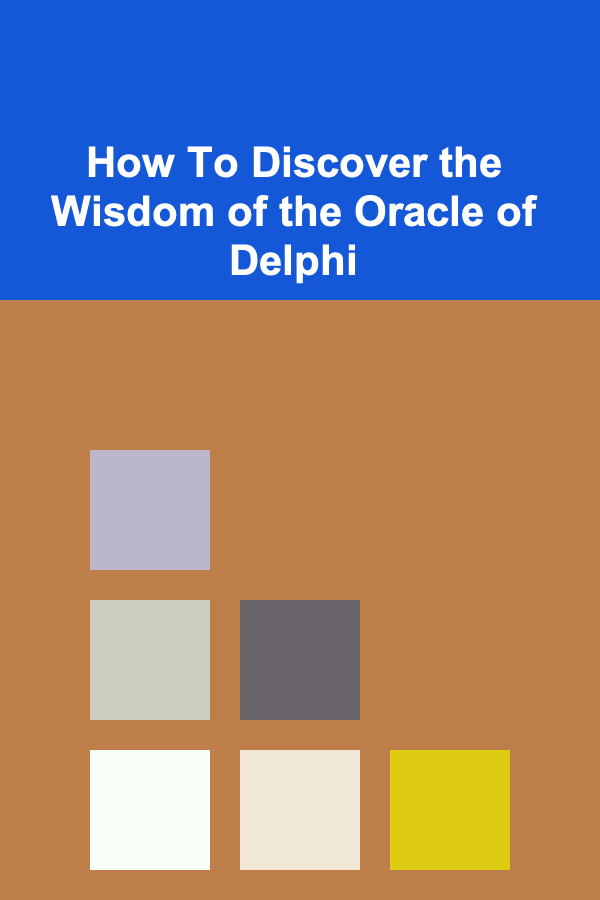
How To Discover the Wisdom of the Oracle of Delphi
ebook include PDF & Audio bundle (Micro Guide)
$12.99$6.99
Limited Time Offer! Order within the next:

The Echo of Antiquity: Introduction to Delphic Wisdom
In the rugged heart of ancient Greece, nestled on the slopes of Mount Parnassus, lay a site of unparalleled spiritual and political significance: Delphi. For over a millennium, from the 8th century BCE to the 4th century CE, Delphi was not merely a sanctuary; it was the omphalos, the "navel of the world," believed to be the very center of the Earth. Here, the Oracle of Apollo, embodied by the enigmatic priestess known as the Pythia, dispensed prophecies that shaped the destinies of individuals, cities, and empires. Kings sought counsel, generals plotted campaigns, and common citizens wrestled with personal dilemmas, all hoping to glean a glimpse into the will of the gods and the unfolding tapestry of fate.
But what was this "wisdom" that Delphi offered? Was it merely fortune-telling, a supernatural glimpse into the future? Or was it something far more profound, a crucible for self-discovery and the forging of character? As we stand in the 21st century, far removed from the fumes of the adyton and the murmurs of the Pythia, the wisdom of Delphi remains surprisingly relevant. It is not about predicting lottery numbers or the outcome of tomorrow's election. Rather, it is about understanding the enduring principles that underpinned its unique efficacy, principles that, when understood and applied, can unlock a deeper wellspring of insight within ourselves. Discovering the wisdom of the Oracle of Delphi today is not about consulting a lost ancient practice; it is about internalizing its essence and applying its profound lessons to the complexities of modern life.
This extensive exploration will delve into the historical context and mechanisms of the Delphic Oracle, but more importantly, it will transcend mere historical recounting. We will examine the philosophical underpinnings that made Delphi so powerful, particularly the famous maxims inscribed upon its temple walls: "Know Thyself" (Gnothi Seauton) and "Nothing in Excess" (Meden Agan). We will dissect the psychology of the oracular process, understanding how the very act of seeking counsel, receiving ambiguous responses, and being forced to interpret them, constituted a transformative journey. Finally, and most crucially, we will outline concrete pathways and practical frameworks for how individuals in the contemporary world can access and apply this ancient wisdom, transforming it from a historical curiosity into a vibrant, living source of guidance and self-awareness.
The Labyrinth of Legend and Reality: Understanding the Delphic Sanctuary
To truly grasp the wisdom of Delphi, one must first immerse oneself in its historical and mythological landscape. The sanctuary was not just a building; it was a complex system of belief, ritual, and human interaction. Its power derived not solely from the Pythia, but from the cumulative weight of tradition, the sacred topography, and the psychological readiness of those who sought its counsel.
The Sacred Topography: Mount Parnassus and the Castalian Spring
Delphi's location was no accident. Mount Parnassus, a majestic and imposing peak, was revered as the home of the Muses and the god Apollo. The very air of Delphi was imbued with an ethereal quality, a sense of proximity to the divine. The site itself features dramatic ravines, cliffs, and the sacred Castalian Spring, whose waters were used for purification rituals before any consultation. This natural grandeur created an immediate sense of awe and reverence, preparing the supplicant's mind for an encounter with the numinous. The landscape served as a primordial cathedral, fostering a state of mind conducive to opening oneself to deeper insights.
The Temple of Apollo and the Omphalos
At the heart of the sanctuary stood the Temple of Apollo, rebuilt numerous times after fires and earthquakes, each iteration adding to its legendary status. Within its innermost chamber, the adyton, sat the Pythia. Nearby, the famous Omphalos stone, a conical marble marker, symbolized Delphi's status as the world's center. This symbolic centering reinforced the idea that Delphi was the focal point where the human and divine realms intersected, a place where universal truths could be accessed.
The Pythia: Voice of the Divine
The Pythia was an ordinary woman, typically of peasant origin, chosen from among the local women of Delphi. She underwent a rigorous process of purification and preparation before each consultation. Seated on a tripod over a fissure in the earth, she would enter a trance-like state, believed to be induced by vapors (a controversial theory that some modern geologists suggest might have had a basis in reality, with ethylene gas or other intoxicating fumes). In this altered state, she would utter pronouncements, often in cryptic and poetic language, which were then interpreted by the attendant priests of Apollo.
The Pythia's role was not to provide direct, unambiguous answers. Her utterances were often fragmented, metaphorical, or open to multiple interpretations. This ambiguity was not a flaw but a fundamental feature of the Delphic process. It forced the supplicant to engage deeply with the message, to reflect on its meaning in the context of their own life and circumstances. The Pythia was a conduit, a mirror, not a decision-maker. Her power lay in her ability to provoke introspection.
The Priests of Apollo: Interpreters and Facilitators
The priests played a crucial role in mediating the oracular experience. They would receive the supplicants' questions, translate the Pythia's often disjointed utterances into hexameter verse, and provide initial interpretations. Their wisdom lay in their understanding of the Pythia's unique language and the nuances of Apollonian theology. They acted as a filter and a guide, ensuring that the wisdom conveyed was framed in a way that the supplicant could begin to comprehend, while still preserving its inherent mystery.
The Supplicants: From Kings to Commoners
The queue to consult the Oracle was long and often required considerable patience and payment. Supplicants came from all walks of life and from across the Greek world and beyond. Their questions ranged from the deeply personal---should I marry? Will my child be healthy?---to matters of state---should we go to war? Where should we found a new colony? The act of making the pilgrimage, undergoing the purification rituals, and waiting for one's turn was itself a transformative experience, demanding patience, humility, and clear intention. It forced individuals to truly formulate their questions, to distill their anxieties and hopes into a coherent inquiry.
The Decline and End of the Oracle
The Oracle of Delphi flourished for centuries, but its influence waned with the rise of new philosophical schools, the expansion of the Roman Empire, and eventually, the triumph of Christianity. Emperor Theodosius I, in 392 CE, issued decrees that effectively banned pagan worship, leading to the closure of the Delphic sanctuary. Its long reign as the spiritual heart of the Greek world came to an end, its wisdom seemingly lost to the annals of history.
The Philosophical Cornerstones: "Know Thyself" and "Nothing in Excess"
While the rituals and prophecies of Delphi were captivating, its enduring legacy rests on two fundamental principles inscribed on the Temple of Apollo. These maxims, seemingly simple, hold a universe of profound wisdom and form the bedrock upon which any modern discovery of Delphic insight must be built.
Gnothi Seauton: "Know Thyself"
This is arguably the most famous and impactful of all Delphic maxims. It is not merely an injunction to be self-aware but a profound philosophical imperative that echoes throughout Western thought, particularly in the Socratic tradition. Socrates himself claimed that his lifelong philosophical quest was inspired by the Delphic Oracle's pronouncement that he was the wisest man, which he interpreted not as a statement of superior knowledge, but as an affirmation that his wisdom lay in his awareness of his own ignorance.
What "Know Thyself" Entails:
- Self-Awareness: Understanding one's strengths, weaknesses, motivations, desires, fears, and biases. This is a continuous process, not a one-time revelation. It involves honest introspection, often uncomfortable and challenging.
- Self-Limitation: Recognizing the boundaries of one's knowledge and capabilities. It is a humble acknowledgment that human understanding is finite, and there are truths beyond our immediate grasp. This humility prevents hubris, a common flaw that often led to tragic outcomes in Greek myths and history.
- Understanding Human Nature: Beyond individual introspection, "Know Thyself" extends to a deeper understanding of the universal human condition, our shared vulnerabilities, aspirations, and patterns of behavior.
- Moral and Ethical Foundation: True self-knowledge is intrinsically linked to ethical conduct. When one understands their true nature and purpose, they are better equipped to make virtuous choices aligned with their deepest values.
- The Path to Wisdom: For the Greeks, wisdom wasn't just about accumulating facts; it was about living well, making sound judgments, and achieving eudaimonia (flourishing). "Know Thyself" is the essential first step on this path. Without it, external knowledge is merely information, not transformative wisdom.
Meden Agan: "Nothing in Excess" or "Avoid Extremes"
Complementing "Know Thyself," this maxim promotes balance, moderation, and temperance. It is a powerful antidote to the human tendency towards hubris and the pursuit of extreme passions, which the Greeks often saw as leading to disaster. It applies to all aspects of life: wealth, power, pleasure, sorrow, ambition, even virtue itself.
What "Nothing in Excess" Entails:
- Moderation in All Things: It advocates for finding the "golden mean," the middle ground between two extremes. Too much indulgence leads to excess; too much abstinence leads to deprivation. Wisdom lies in finding the appropriate measure.
- Emotional Regulation: It applies to the mastery of emotions. While emotions are natural, uncontrolled anger, grief, joy, or desire can lead to irrational decisions and destructive outcomes.
- Balanced Pursuit of Goals: Ambition is good, but unchecked ambition can lead to tyranny or ruin. The pursuit of wealth is natural, but greed is destructive. This principle encourages a mindful approach to all endeavors.
- Ecological Harmony: In a broader sense, it can be interpreted as a call for living in harmony with nature and not exploiting resources beyond their sustainable limits -- a strikingly prescient message for our current environmental crises.
- Prevention of Hubris: This maxim directly combats hubris, the excessive pride or self-confidence that often leads to a tragic downfall. By constantly checking one's tendencies towards extremes, one guards against overstepping boundaries, whether human or divine.
Together, "Know Thyself" and "Nothing in Excess" form a powerful dual key to living a wise and virtuous life. One instructs us to look inward and understand our inherent nature and limitations; the other guides us in how to act in the world, maintaining balance and avoiding the pitfalls of extremism. These are not passive statements but active commands, demanding continuous application and refinement.
The Psychology of the Oracle: A Mirror for the Soul
Beyond the historical facts and philosophical maxims, the true genius of Delphi lay in its understanding of human psychology. The entire process of consulting the Oracle was designed not merely to deliver an answer, but to catalyze a journey of introspection and self-discovery within the supplicant.
The Power of the Question
Before any prophecy could be uttered, the supplicant had to formulate a question. This seemingly simple act was profoundly important. It forced individuals to articulate their deepest concerns, to distill ambiguity into a specific inquiry. In doing so, they often gained clarity simply through the process of mental organization and articulation. The priests often helped refine these questions, guiding the supplicant towards more meaningful inquiries. This preparatory phase was, in essence, the first step towards self-understanding.
In modern terms, this highlights the importance of precise, honest self-inquiry. We often seek answers before we have fully understood the question. The Delphic process implicitly taught that a well-formulated question is often half the answer.
The Ambiguity of Prophecy: The Catalyst for Interpretation
The Pythia's pronouncements were notoriously ambiguous. Croesus, King of Lydia, famously received the prophecy that if he attacked the Persians, a great empire would fall. He attacked, and his own empire fell. This ambiguity was not a defect but a deliberate design feature. It prevented the Oracle from being definitively wrong, but more importantly, it shifted the burden of responsibility and interpretation onto the supplicant. The oracle did not dictate fate; it presented possibilities, requiring the individual to actively engage with the message.
This forced engagement was the true source of wisdom. The supplicant had to:
- Reflect deeply: What could the prophecy mean in my specific context?
- Consider multiple perspectives: Are there other ways to interpret these words?
- Engage critical thinking: How does this relate to my current knowledge and values?
- Take responsibility: The ultimate decision was theirs, not the Oracle's. The oracle provided guidance, not absolution from choice.
The ambiguity acted as a psychological mirror. It reflected the supplicant's own biases, fears, and desires back at them through the lens of the prophecy. The "answer" wasn't given; it was discovered through active interpretation and application.
The Therapeutic Aspect: Catharsis and Acceptance
For many, the pilgrimage to Delphi and the act of consulting the Oracle served a therapeutic function. The journey itself, the waiting, the purification rituals, the solemn atmosphere---all contributed to a profound emotional experience. Articulating fears and anxieties, even to a priest, could be cathartic. Receiving a response, even an ambiguous one, could provide a sense of validation, closure, or direction.
Moreover, the Oracle often highlighted the inescapable nature of fate or the consequences of human actions. This could lead to a form of acceptance, a recognition that while one could not control everything, one could control one's response. In this sense, Delphi was a proto-psychological counseling center, helping individuals navigate the complexities of their inner and outer worlds.
The Public and Communal Dimension
The wisdom of Delphi was not just for private consumption. The Oracle's pronouncements often affected entire city-states. The process of consultation and interpretation was often a public affair, involving delegations, debates, and collective decision-making. This communal aspect fostered a shared understanding of challenges and solutions, reinforcing social cohesion and collective responsibility.
The Pan-Hellenic nature of Delphi, transcending individual city-states, also promoted a sense of shared Greek identity and moral values. It was a place where common principles of justice, moderation, and piety were reinforced through divine pronouncements.
Pathways to Modern Delphic Wisdom: How to Discover It Today
The Oracle of Delphi, as a physical institution, is long gone. Yet, its wisdom is not locked in ancient ruins. It is a timeless methodology for self-discovery and navigating life's complexities. Discovering this wisdom today involves an internal pilgrimage, a commitment to introspection, and a reinterpretation of ancient practices for the modern mind. Here's how to embark on this journey:
1. Cultivate the "Sacred Space" Within
The physical sanctuary of Delphi prepared the supplicant's mind. Today, you must create your own inner sanctuary. This doesn't require a temple or specific landscape, but rather a dedicated mental and emotional space for introspection.
- Mindfulness and Meditation: Regular practice helps quiet the external noise and allows you to access deeper layers of your consciousness. This is your personal adyton, where internal "vapors" of thought and intuition can arise.
- Quiet Reflection: Dedicate time each day or week for undistracted thought. This could be walking in nature, sitting in silence, or simply unplugging from digital distractions.
- Journaling: The act of writing down your thoughts, feelings, and questions is akin to formulating your query for the Oracle. It brings clarity, coherence, and allows patterns to emerge. This is your personal consultation record.
2. Embrace "Know Thyself" as a Lifelong Quest
This is the bedrock. It's not a destination but a continuous journey of self-discovery. Apply the Socratic method to your own life:
- Relentless Self-Inquiry: Regularly ask yourself probing questions:
- What are my core values? Am I living in alignment with them?
- What truly motivates my actions (beyond superficial desires)?
- What are my fears, and how do they influence my decisions?
- What are my true strengths and weaknesses? Am I honest about them?
- Why do I react the way I do in certain situations?
- Seek Feedback (from your "Priests"): Just as the priests interpreted for the Pythia, seek trusted friends, mentors, therapists, or coaches who can offer objective perspectives on your blind spots. They can help you decipher the "ambiguous" parts of your own psyche.
- Observe Your Patterns: Pay attention to recurring behaviors, thoughts, and emotions. What do they tell you about yourself? What are the underlying beliefs driving them?
- Examine Your Assumptions: Many of our decisions are based on unexamined assumptions. Question them vigorously. Is this truly my belief, or one I've inherited?
3. Internalize "Nothing in Excess": The Art of Balance
This principle guides your actions and choices. It's about moderation, self-control, and finding the sweet spot in every aspect of life.
- Mindful Consumption: Apply this to food, media, information, spending, and even work. Are you consuming too much or too little? Is it serving your well-being or depleting it?
- Emotional Intelligence: Practice emotional regulation. Recognize when emotions are becoming extreme and find healthy ways to process them without repression or explosion.
- Balanced Pursuits: Evaluate your life areas---work, relationships, health, personal growth, leisure. Are you overly focused on one to the detriment of others? Seek harmony.
- Humility and Acknowledging Limits: Understand that you are not omnipotent or infallible. Recognize your human limitations and avoid hubris. This protects you from catastrophic errors.
- Sustainable Living: Extend "Nothing in Excess" to your relationship with the planet. Consume mindfully, reduce waste, and live in a way that respects ecological balance.
4. Become Your Own Pythia: Accessing Intuition and Inner Guidance
The Pythia was a conduit. You too have an inner conduit to deeper wisdom, often called intuition, gut feeling, or the subconscious mind.
- Listen to Your Body: Often, physical sensations are a direct line to intuition. A knot in your stomach, a feeling of lightness -- these can be internal "oracular" signals.
- Dreams: Pay attention to your dreams. They are often symbolic messages from your subconscious, much like the Pythia's ambiguous pronouncements. Journaling your dreams can help you interpret them.
- Creative Expression: Engaging in art, music, writing, or any creative endeavor can tap into non-rational parts of your mind, revealing insights that logical thought cannot.
- "Incubation" Periods: When facing a difficult decision, thoroughly research and analyze, then step away. Let your subconscious mind work on it. Often, the "answer" will emerge unexpectedly, much like a spontaneous oracle.
- Symbolic Thinking: Learn to think symbolically. The world around us, like the Pythia's words, is full of metaphors and archetypes that can offer guidance if we learn to see them.
5. Master the Art of Interpretation: Deciphering Ambiguity
This is where the real work begins. The inner "Pythia" might offer an ambiguous response. Your task is to interpret it meaningfully.
- Contextualize: How does the insight or feeling relate to your specific life situation, your values, and your current challenges?
- Explore Multiple Meanings: Don't settle for the first interpretation. Brainstorm several possibilities. Which resonates most deeply? Which feels most aligned with your authentic self?
- Test and Refine: Consider how different interpretations would lead to different actions. Which path feels most constructive and responsible?
- Embrace Paradox: Sometimes, the wisdom comes not from a clear-cut answer, but from holding contradictory ideas simultaneously. Life is often ambiguous, and wisdom lies in navigating that complexity.
- Avoid Projection: Be vigilant against projecting your own desires or fears onto the "message." Seek objective truth as much as possible.
6. The Call to Action and Responsibility
The Oracle never made decisions for anyone. It offered guidance, but the supplicant bore the full responsibility for their choices and their consequences. This is perhaps the most crucial aspect of Delphic wisdom for modern application.
- Ownership of Decisions: Once you've sought inner counsel and interpreted its meaning, you must take ownership of the choices you make. There is no external authority to blame or rely on completely.
- Courage to Act: Wisdom without action is inert. The insights you gain must translate into deliberate choices and behaviors.
- Learning from Consequences: If an action doesn't yield the desired outcome, don't view it as a failure of the "oracle." Instead, analyze what happened. What did you learn? How can you refine your interpretation or approach next time? This is part of the ongoing "Know Thyself" process.
- Ethical Accountability: Ensure your actions are not only personally beneficial but also ethically sound and contribute positively to your community, reflecting the communal aspect of ancient Delphi.
7. Engage with Myth and Archetype
The stories surrounding Delphi -- Apollo's slaying of the Python, the Omphalos stone, the figures of Greek mythology -- are not mere fairy tales. They are rich with symbolic meaning and archetypal patterns that reflect universal human experiences.
- Study Greek Mythology: Explore the myths not as historical accounts but as psychological dramas. What do figures like Apollo, Dionysus, or even the tragic heroes reveal about human nature and the consequences of certain actions?
- Identify Archetypes in Your Life: Recognize the archetypal roles you or others play. Are you embodying the hero, the trickster, the sage, the shadow? Understanding these patterns can provide profound self-insight.
- Dream Analysis: As mentioned, dreams often speak in symbolic, archetypal language. Learning to interpret these can be a powerful way to access subconscious wisdom.
8. Foster a Community of Inquiry (Modern Amphictyony)
The Amphictyonic League was an association of Greek city-states that governed the Delphic sanctuary, ensuring its peace and sacred status. While we don't have such an institution today, the spirit of communal inquiry can be replicated.
- Engage in Meaningful Dialogue: Seek out groups, friends, or communities where you can discuss profound questions, share insights, and challenge each other's perspectives respectfully.
- Learn from Diverse Viewpoints: Just as different city-states brought their unique perspectives to Delphi, expose yourself to diverse philosophies, cultures, and ways of thinking.
- Collaborative Problem Solving: Apply the Delphic model to group challenges. Clearly define the "question," invite multiple interpretations, and collectively decide on the best course of action.
Challenges and Pitfalls in Seeking Delphic Wisdom
The path to discovering internal Delphic wisdom is not without its obstacles. Understanding these challenges can help you navigate them more effectively.
- Impatience and Desire for Instant Answers: We live in a world of instant gratification. Delphic wisdom, like all true wisdom, requires patience, sustained effort, and a willingness to sit with uncertainty. It's a journey, not a Google search.
- Literal Interpretation: Expecting concrete, undeniable answers leads to disappointment. The wisdom lies in the process of interpretation, not in a simplistic prophetic declaration.
- Projection and Confirmation Bias: It's easy to interpret internal insights to confirm what you already want to believe. This defeats the purpose of honest self-inquiry. Deliberately challenge your initial interpretations.
- Avoiding Responsibility: Some seek external guidance to avoid making difficult choices themselves. The essence of Delphi is to empower personal responsibility, not to provide an escape from it.
- Lack of Self-Discipline: The practices required---mindfulness, journaling, self-inquiry---demand consistent effort. Without discipline, the "inner temple" remains unvisited.
- Hubris (Ignoring "Nothing in Excess"): Believing you have all the answers, or that your intuitive insights are infallible, is the ultimate antithesis of Delphic wisdom. True wisdom is always open to revision and acknowledges its own limits.
Overcoming these pitfalls requires humility, perseverance, and a deep commitment to truth, even when it's uncomfortable.
The Enduring Legacy: Why Delphi Still Matters
The Oracle of Delphi might be a ruin, but its spirit endures as a powerful metaphor for human potential and the timeless quest for meaning. Its wisdom is not about knowing the future, but about mastering the present through profound self-awareness and balanced action. It is a philosophy for living, a guide to navigating the ambiguities of existence with clarity, humility, and responsibility.
In an age saturated with information but starved of wisdom, the Delphic principles offer a much-needed compass. When external authorities often contradict, when algorithms attempt to dictate our preferences, the call to "Know Thyself" becomes an act of radical self-empowerment. It is a rebellion against external programming, an insistence on authentic inner guidance.
When society fragments into extreme factions and echo chambers, the principle of "Nothing in Excess" offers a vital plea for balance, moderation, and the search for common ground. It reminds us that wisdom often lies not in rigid dogma, but in the flexible space between extremes.
Ultimately, discovering the wisdom of the Oracle of Delphi today is not a passive intellectual exercise. It is an active, ongoing engagement with oneself and the world. It is the challenging yet profoundly rewarding journey of becoming one's own oracle, listening to the murmurs of one's deepest self, interpreting the ambiguous signs of life, and taking courageous, responsible action. The wisdom of Delphi waits, not on a mountain in Greece, but within the sacred precincts of your own mind and heart, ready to be discovered and lived. © 2023. All rights reserved.

How to Create a Festive Atmosphere in Small Spaces
Read More
How to Create a Profitable Travel Lifestyle: Make Money While You Explore
Read More
How to Prepare Your Dog for Boarding at Hyde Park
Read More
How to Prioritize Home Repairs and Upgrades
Read More
The Art and Science of Perfect Soft-Boiled Eggs
Read More
How to Choose Wine for a Dinner Party: A Comprehensive Guide
Read MoreOther Products

How to Create a Festive Atmosphere in Small Spaces
Read More
How to Create a Profitable Travel Lifestyle: Make Money While You Explore
Read More
How to Prepare Your Dog for Boarding at Hyde Park
Read More
How to Prioritize Home Repairs and Upgrades
Read More
The Art and Science of Perfect Soft-Boiled Eggs
Read More